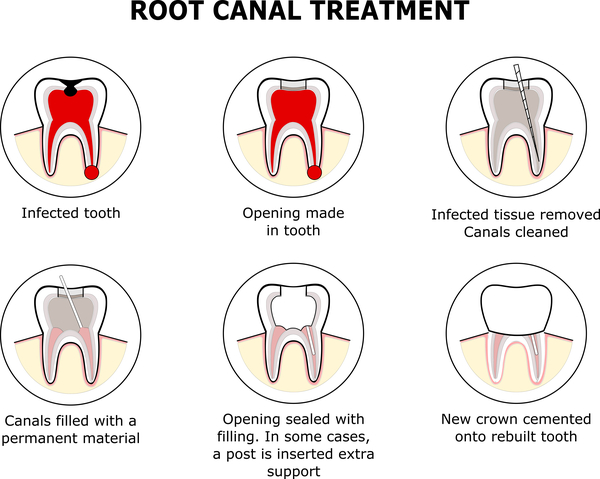When the root of a tooth contains damaged nerve tissue, bacteria and infection are likely to develop. These infections can be painful, and when left untreated, can lead to more severe health problems. As part of our general dentistry services, cosmetic dentist Robin Rutherford, DDS and his team can use root canal therapy to eliminate your pain and reduce the risk of further health complications.
- What Is Root Canal Therapy?
- Root Canal Therapy Benefits
- Root Canal Therapy Candidates
- Root Canal Therapy Procedure
- Root Canal Therapy Recovery
- Root Canal Therapy Prevention
What Is Root Canal Therapy?
Root canal therapy, also known as endodontics, is designed to remove damaged nerve tissue within the root canal. This damaged tissue is often the result of a cavity that has led to advanced decay or infection. Removing the affected nerve tissue can be a necessary step toward stopping your oral discomfort as well as the spread of infection. When left untreated, damaged and infected nerve tissue in the root canal can lead to abscesses, bone loss, or even tooth extraction.
What Are The Benefits Of Root Canal Therapy?
The main benefit of root canal therapy is removing the damaged tissue to eliminate pain and help prevent the spread of further infection or decay. Root canals are designed to preserve the natural tooth, and the advanced procedure has a very high success rate. When performed in a timely manner, a root canal can also help prevent the need for a tooth extraction or a replacement tooth.
Who Is a Candidate for Root Canal Therapy?
Ideal candidates for root canal treatment often include those who:
- Are experiencing ongoing pain in their tooth, especially when applying pressure or chewing, due to severe damage, decay, and/or infection
- Have teeth that remain highly sensitive to hot or cold food and drink temperatures
- Have swollen gums around the tooth that may also be painful and tender
- Have an abscess or growth in the area around an infected tooth
- Suffer from tooth damage that may have exposed the nerve and increased the risk of infection
If you are unsure about your candidacy for root canal therapy, please schedule a consultation with Dr. Rutherford. He will assess your symptoms and examine the affected tooth and surrounding gums to determine if a root canal is the best approach for improving your oral health.
What Can I Expect During The Root Canal Therapy Procedure?
Before the procedure begins, an anesthetic will be used to numb the area – sedation dentistry may also be used to help maximize your comfort. Once a small hole is drilled in the tooth, Dr. Rutherford can access the root canal to remove the damaged nerve tissue. Afterward, the root canal will be cleaned to eliminate any infection and bacteria. Depending upon the nature of your case, Dr. Rutherford may be able to seal the tooth immediately. Some patients will need to use medication to complete the root canal therapy, and in these cases a temporary filling may be used. If you have a tooth that has suffered from extensive decay, Dr. Rutherford may recommend a porcelain crown to preserve the integrity of the tooth structure.

What Is Recovery Like Following Root Canal Therapy?
Most patients are able to return to their normal activities within a day after root canal therapy. Some mild discomfort in the treatment area may be present after the anesthetic wears off; however, over-the-counter pain medication can help manage this discomfort until it dissipates on its own. It is often recommended to eat soft foods for a few days to avoid irritating the treatment site. Maintaining oral hygiene is important, but you should brush gently around the treated tooth while it heals. Follow-up appointments will be necessary to ensure proper healing and to eventually place a permanent filling or crown.
How Do I Prevent the Need for Root Canal Therapy?
To prevent the need for root canal therapy, it is important to maintain regular dental check-ups, examinations, and cleanings. Proper oral hygiene is crucial and, at a minimum, means brushing twice daily with fluoride toothpaste and flossing at least once a day to remove dental plaque. Limiting sugary and acidic foods and drinks can help protect tooth enamel from erosion and decay. Wearing a mouthguard while engaging in sports and activities that heighten the risk of facial impact can also help reduce dental injuries that might expose nerves. Additionally, addressing dental issues like cavities and tooth damage early can help prevent infections that may necessitate a root canal.
Contact The Art of Dentistry
To learn more information about root canal therapy, please contact our office today to schedule your appointment.
